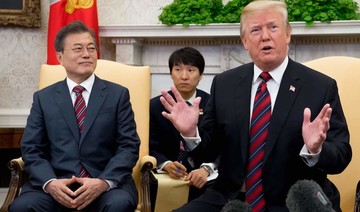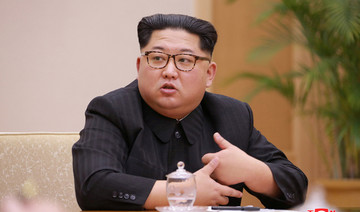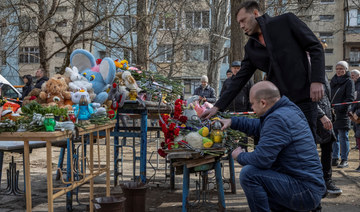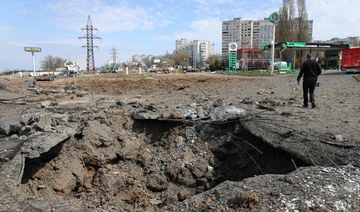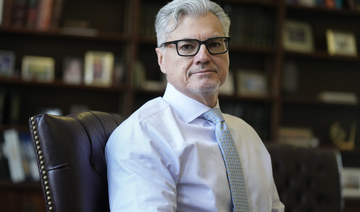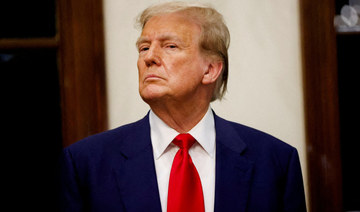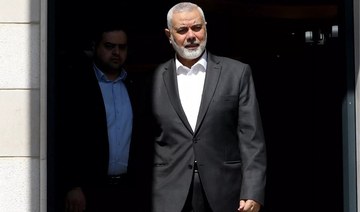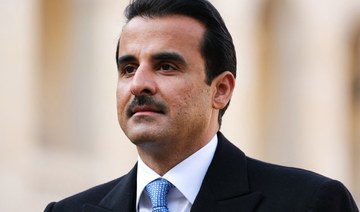TOKYO: North Korea has renewed its threat to pull out of a summit next month with President Donald Trump, saying it is just as ready to meet in a nuclear confrontation as at the negotiating table.
Pyongyang’s latest salvo follows recent comments by US Vice President Mike Pence suggesting the North may end up like Libya if it doesn’t move forward with denuclearization.
Choe Son Hui, the vice minister of foreign affairs, was quoted Thursday by the North’s state-run news agency slamming as “ignorant” and “stupid” comments Pence made in an interview with Fox News that compared North Korea to Libya, saying they showed he does not understand North Korea’s situation.
She also questioned whether the summit, scheduled for June 12 in Singapore, would be worthwhile if the remarks reflect Washington’s position.
“We will neither beg the US for dialogue nor take the trouble to persuade them if they do not want to sit together with us,” KCNA quoted her as saying. “Whether the US will meet us at a meeting room or encounter us at nuclear-to-nuclear showdown is entirely dependent upon the decision and behavior of the United States.”
The summit plan has hit a number of speed bumps recently as both sides have begun taking tougher positions and trading barbs. Trump met with South Korean President Moon Jae-in on Tuesday at the White House for consultations and suggested the summit could be delayed. But the US says it is still working on making it happen.
Choe, a veteran diplomat and former head of the North America desk at the Foreign Ministry, was responding to comments Pence made to Fox News this week that it would be a “mistake” for the North Koreans to think they can “play” Trump. Pence said both the Clinton and Bush administrations had been “played” by the North Korean government.
“We offered concessions to the North Korean regime in exchange for promises to end their nuclear weapons program, only to see them break those promises and abandon them,” he said, adding that if Pyongyang does not go along with talks to give up its nuclear weapons, Washington could return to the “Libya model.”
That suggestion, which was made earlier this month by National Security Adviser John Bolton and also sparked an outraged response from the North, is especially inflammatory to Pyongyang.
The Libya model refers to negotiations in 2004 that led to the shipping of nuclear components to the US from Libya under Muammar Qaddafi. But in Pyongyang’s mind the most important part of the story is what came after that. Qaddafi was deposed after a 42-year reign and killed in 2011 — the year Kim assumed power in North Korea — while his country spiraled into chaos.
“In view of the remarks of the US high-ranking politicians who have not yet woken up to this stark reality and compare the DPRK to Libya that met a tragic fate, I come to think that they know too little about us,” she said, using the acronym for North Korea’s official name.
She added: “To borrow their words, we can also make the US taste an appalling tragedy it has neither experienced nor even imagined up to now.”
How seriously the North would really consider calling off the summit isn’t entirely clear, however.
Meeting with Trump as an equal on the world stage would be an important moment for Kim and Choe couched her statement carefully, noting that she would only recommend the North Korean leader withdraw from the meeting if Washington “clings to unlawful and outrageous acts.”
North Korea was also expected to go through with a major gesture of goodwill ahead of the summit by dismantling its nuclear test site. The North, which has vowed to stop all underground nuclear testing and intercontinental ballistic missile launches, has invited foreign media to the remote site to observe a ceremony to mark the closing.
The ceremony was expected to be held Thursday or Friday, depending on the weather.
Pyongyang hits Pence ‘stupid’ remarks, threatens to quit summit
Pyongyang hits Pence ‘stupid’ remarks, threatens to quit summit
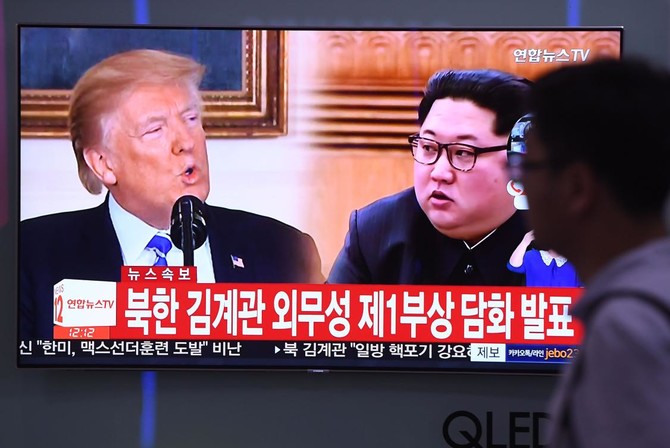
Dutch intelligence sees the wars in Gaza and Ukraine as triggers for terrorist threats
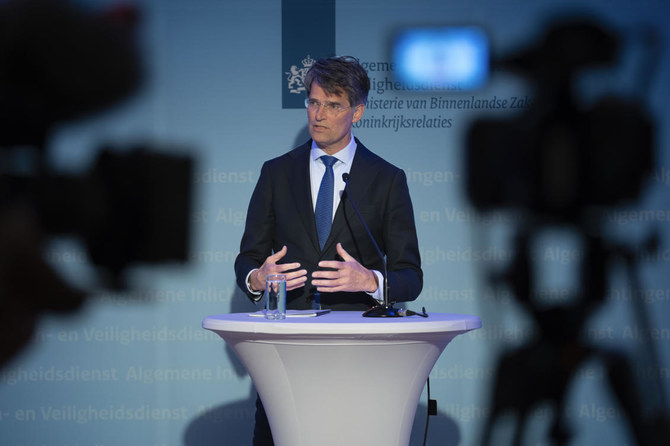
“The terrorist threat is serious at this moment,” the agency’s director-general, Erik Akerboom, told AP
ZOETERMEER, Netherlands: The Dutch national intelligence agency said Tuesday that threats targeting the Netherlands are increasingly connected to worldwide turmoil, including the wars in Gaza and Ukraine.
Although the number of terror attacks across Europe has been down in recent years, the General Intelligence and Security Service in its annual report said the Israel-Hamas war in Gaza and the destruction of a Qur’an outside parliament last year are “trigger events” for extremists.
“The terrorist threat is serious at this moment,” the agency’s director-general, Erik Akerboom, told The Associated Press.
Akerboom said he is particularly concerned about big events, noting that the agency is working closely with French authorities to prevent incidents during the Paris Olympics this summer.
In December, the Dutch counterterrorism agency increased the country’s threat alert to its second-highest level because of concerns about the Daesh group’s Khorasan affiliates, Akerboom said. IS-K, a Central Asian affiliate, was responsible for the attack at a suburban Moscow concert hall that killed at least 133 people in March.
According to the new report, “global jihadism has been the greatest terrorist threat for years in the Netherlands.” Incidents such as the one last April, when an anti-Islam activist tore pages from the Qur’an in front of the Dutch parliament building, put the Netherlands on the map of targets.
About a dozen terror attacks were thwarted by authorities in Europe last year and in four cases, suspects were arrested in the Netherlands, the report said. None of those attacks was focused on the Netherlands, according to Akerboom.
The Dutch also see threats from China, in particular cyberattacks, as a major concern. Akerboom said China is producing more hackers to break into Dutch systems than the Dutch can produce to defend them. The security service has cited China as the biggest threat to the country’s economic security.
Russia also continues to pose a risk to the Netherlands amid Moscow’s full-scale invasion of Ukraine. So-called peace protests in Amsterdam which call for the Dutch to stop sending arms to Ukraine have included demonstrators paid by Russian sources to attend and given prefabricated slogans, the security service has asserted.
The Netherlands is of particular interest to Moscow in part because of the international institutions housed here, including the International Criminal Court. The Hague-based court is investigating crimes in Ukraine and has issued arrest warrants for President Vladimir Putin and other Russians.
Sunak says UK to raise defense spending amid global threats
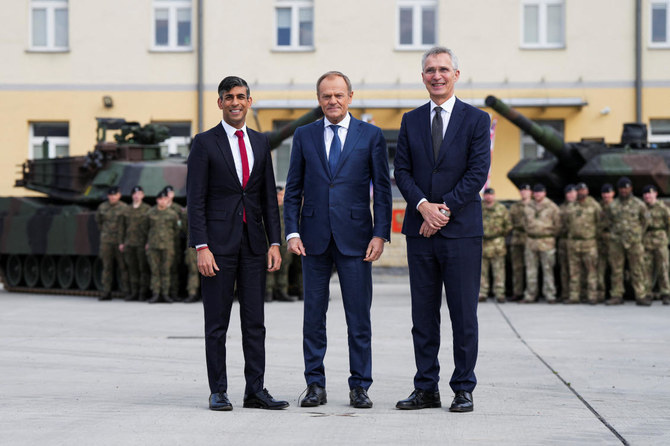
- “In a world that is the most dangerous it has been since the end of the Cold War, we cannot be complacent,” Sunak told reporters
- The increase in spending from 2.3 percent will see the UK become one of the highest spenders on defense in the 32-member defense alliance
WARSAW: Britain will raise defense spending to 2.5 percent of GDP by 2030 in a “most dangerous” world, Prime Minister Rishi Sunak said Tuesday during a visit to Poland.
The commitment came as NATO countries face pressure to raise defense spending in the face of global threats, particularly from Russia.
“In a world that is the most dangerous it has been since the end of the Cold War, we cannot be complacent,” Sunak told reporters in Warsaw, where he held a press conference with NATO Secretary-General Jens Stoltenberg.
The increase in spending from 2.3 percent will see the UK become one of the highest spenders on defense in the 32-member defense alliance after the United States, the British government said.
It means the UK is expected to spend £87 billion on defense in 2030-31, an increase of £23 billion over current levels.
“I believe we must do more to defend our country, our interests, and our values,” Sunak said, announcing “the biggest strengthening of national defense for a generation.”
Western nations are under pressure to boost defense funding following Moscow’s invasion of its neighbor Ukraine as well as the threat of escalation in the Middle East.
EU chief Ursula von der Leyen recently called for a “European awakening on defense and security.”
Brussels is set to come up with more proposals for financing the defense push by a summit of EU leaders in June.
Sunak has also faced calls from his Conservative Party to boost defense spending, with some calling for a level of three percent of GDP.
On Tuesday, Sunak also announced £500 million additional funding for Ukraine’s war effort against Russia.
A Russian strike on Kharkiv’s TV tower is part of an intimidation campaign, Ukraine’s Zelensky says

- Kharkiv region straddles the approximately 1,000-kilometer front line where Ukrainian and Russian forces have been locked in battle for more than two years
- “Four priorities are key: defense of the sky, modern artillery, long-range capacity, and to ensure that packages of American aid arrive as soon as possible,” Zelensky said
KYIV: Ukrainian President Volodymyr Zelensky said a Russian missile strike that smashed a prominent skyline television tower in Kharkiv was part of the Kremlin’s effort to intimidate Ukraine’s second-largest city, which in recent weeks has come under increasingly frequent attack.
The strike sought to “make the terror visible to the whole city and to try to limit Kharkiv’s connection and access to information,” Zelensky said in a Monday evening address.
The northeastern Kharkiv region straddles the approximately 1,000-kilometer (600-mile) front line where Ukrainian and Russian forces have been locked in battle for more than two years since Moscow’s full-scale invasion of Ukraine. The front line has changed little during a war of attrition, focused mostly on artillery, drones and trenches.
Since late March, Russia has stepped up the pressure on Kharkiv, apparently aiming to exploit Ukraine’s shortage of air defense systems. It has pounded the local power grid and hit apartment blocks.
On Monday, a Russian Kh-59 missile struck Kharkiv’s 250-meter (820-foot) -high TV tower, breaking it roughly in half and halting transmissions.
A Washington think tank said Russia may be eyeing a ground assault on Kharkiv.
“The Kremlin is conducting a concerted air and information operation to destroy Kharkiv City, convince Ukrainians to flee, and internally displace millions of Ukrainians ahead of a possible future Russian offensive operation against the city or elsewhere in Ukraine,” the Institute for the Study of War said in an assessment.
The expected arrival in Ukraine in coming weeks of new military aid from its Western partners possibly has prompted Russia to escalate its attacks before the help arrives, the ISW said, adding that trying to capture Kharkiv would be “a significant challenge” for the Kremlin’s forces.
Instead, the Russian military command “may attempt to destroy Kharkiv City with air, missile, and drone strikes and prompt a large-scale internal displacement of Ukrainian civilians,” it said.
The US Senate was returning to Washington on Tuesday to vote on $61 billion in war aid to Ukraine after months of delays. Zelensky said US President Joe Biden assured him the aid would include long-range and artillery capabilities.
“Four priorities are key: defense of the sky, modern artillery, long-range capacity, and to ensure that packages of American aid arrive as soon as possible,” Zelensky said.
Also Tuesday, Britain pledged 500 million pounds ($620 million, 580 million euros) in new military supplies for Ukraine, including 400 vehicles, 60 boats, 1,600 munitions and 4 million rounds of ammunition.
The shipment will also include British Storm Shadow long-range missiles, which have a range of about 150 miles (240 kilometers) and have proven effective at hitting Russian targets, the British government said.
British Prime Minister Rishi Sunak spoke with Zelensky on Tuesday morning to confirm the new assistance. He was due to announce the aid later Tuesday during a visit to Warsaw where he was meeting with Polish Prime Minister Donald Tusk and NATO Secretary General Jens Stoltenberg.
Less cheering news came from the European Union, however. EU countries that have Patriot air defense systems gave no clear sign Monday that they might be willing to send them to Ukraine, which is desperately seeking at least seven of the missile batteries.
Ukraine’s army is also heavily outnumbered in the fight, and expanding the country’s mobilization has been a delicate issue.
Ukrainian Foreign Minister Dmytro Kuleba on Tuesday signaled that authorities plan to clamp down on young men of conscription age who have moved abroad, with details of the specific measures to be made public soon.
“Staying abroad does not relieve a citizen of his or her duties to the homeland,” Kuleba said on the social media platform X.
Meanwhile, Russia launched 16 Shahed drones and two Iskander-M ballistic missiles over Ukraine’s southern and central regions, the Ukrainian air force said Tuesday morning. It said all but one of the drones were intercepted.
In Odesa, an overnight attack injured nine people, regional Gov. Oleh Kiper said. Among those injured were two infants and two children aged nine and 12, Kiper said. City mayor Hennadii Trukhanov said 58 apartments in 22 buildings were damaged.
In other developments:
A Russian missile strike near Dnipro, Ukraine’s fourth-largest city, injured four people who were admitted to hospital, regional Gov. Serhii Lysak said.
Russian forces dropped a guided aerial bomb in Kostiantynivka, a city in the eastern Donetsk region, injuring five people who were riding in a car, police said. Two of them were in critical conditions.
Trump to meet with senior Japanese official after court session Tuesday in hush money trial
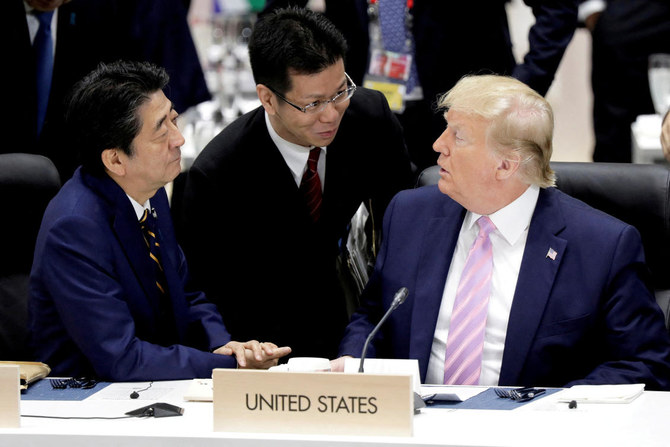
- “Leaders from around the world know that with President Trump we had a safer, more peaceful world,” said Trump spokesperson Brian Hughes
- Trump met last week with Polish President Andrzej Duda at Trump Tower and also met recently with British Foreign Secretary David Cameron and Hungarian Prime Minister Viktor Orbán
WASHINGTON: Former President Donald Trump is meeting with another foreign leader while he’s in New York for his criminal hush money trial.
The presumptive GOP nominee will host former Japanese Prime Minister Taro Aso at Trump Tower Tuesday, according to two people familiar with the plans who spoke on condition of anonymity because they had not been formally announced.
Aso is just the latest foreign leader to spend time with Trump in recent weeks as US allies prepare for the possibility that he could win back the White House this November.
“Leaders from around the world know that with President Trump we had a safer, more peaceful world,” said Trump spokesperson Brian Hughes in a statement. “Meetings and calls from world leaders reflect the recognition of what we already know here at home. Joe Biden is weak, and when President Trump is sworn in as the 47th President of the United States, the world will be more secure and America will be more prosperous.”
Trump met last week with Polish President Andrzej Duda at Trump Tower and also met recently with British Foreign Secretary David Cameron and Hungarian Prime Minister Viktor Orbán.
Trump was close with Shinzo Abe, the former Japanese prime minister who was assassinated in 2022. Aso is vice president of the Japanese Liberal Democratic Party and also served as deputy prime minister and finance minister under Abe.
Trump has threatened to impose broad new tariffs if he wins a second term.
Early Tuesday morning, he complained about the US dollar reaching a new high against the Japanese yen, calling it “a total disaster for the United States.”
“When I was President, I spent a good deal of time telling Japan and China, in particular, you can’t do that,” he wrote on his Truth Social platform. “It sounds good to stupid people, but it is a disaster for our manufacturers and others.”
The US dollar is trading at above 150 yen recently, up from 130-yen mark a year ago, which has made it more costly for Japan to import goods but has boosted exports.
President Joe Biden hosted current Japanese Prime Minister Fumio Kishida at the White House for talks and a state dinner earlier this month. During the visit, the leaders announced plans to upgrade US-Japan military relations, with both sides looking to tighten cooperation amid concerns about North Korea’s nuclear program and China’s increasing military assertiveness in the Pacific.
Bangladesh, Qatar sign 10 cooperation deals during emir’s first Dhaka trip
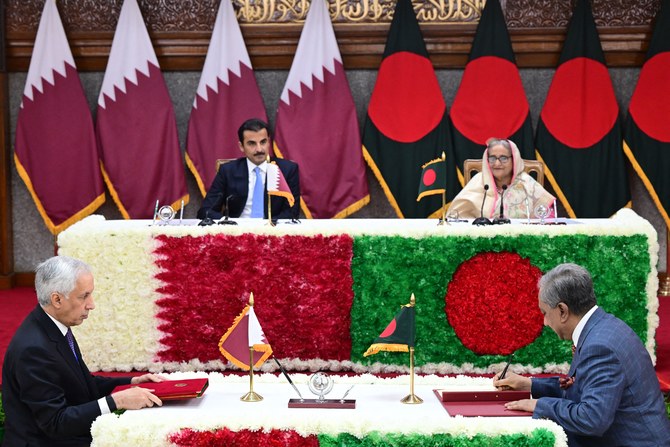
- Agreements cover investment, maritime transport and establishment of joint business council
- Bangladeshi president invited Qatar’s emir to invest in the country’s special economic zones
DHAKA: Bangladesh and Qatar signed 10 cooperation agreements on Tuesday as the Gulf state’s Emir Sheikh Tamim bin Hamad Al-Thani made his first official visit to Dhaka.
Prime Minister Sheikh Hasina and Sheikh Tamim witnessed the signing ceremony, which covered deals on investment, maritime transport, taxation, legal affairs and the establishment of a Bangladesh-Qatar joint business council.
The two countries also signed several memoranda of understanding, including on diplomatic training, education, labor, youth and sports, as well as port management cooperation.
Sheikh Tamim then held a meeting with President Mohammed Shahabuddin as part of his visit to Bangladesh, which is the second stop in the emir’s Asia tour that began in the Philippines on Sunday.
During their talks, Shahabuddin invited Qatar to invest in Bangladesh’s special economic zones.
“Bangladesh will welcome investments in various sectors including in state-led food supply chains from production to consumption such as agro-production and processing, food packaging, smart agriculture and fertilizer production,” Shahabuddin’s press secretary Joynal Abedin told reporters after the meeting.
“Qatar investors can get massive incentives and support in sectors like petrochemicals, energy, machineries, information technology, electronics, ceramics, agri-business, and food processing in Bangladesh.”
Shahabuddin also urged Sheikh Tamim to recruit more skilled workers from Bangladesh during their talks, Abedin said.
Qatar is currently the largest supplier of liquefied natural gas to Bangladesh. Earlier this year, the emirate signed a 15-year agreement with the US-based Excelerate Energy to supply 1 million metric tons per year of LNG to Bangladesh starting from January 2026.
The Gulf state is also home to about 400,000 Bangladeshis who live and work there, as it is one of the preferred destinations for migrant workers from the South Asian country.


